#rumeysa hatun
Explore tagged Tumblr posts
Text






This white and golden kaftan was first worn by Hürrem Sultan in the tenth episode of the first season of Magnificent Century. It appeared again on a young Hafsa Sultan in a flashback during the thirty-fourth episode of the second season. The kaftan was also worn by Mihrimah Sultan in the twelth episode of the third season. The fourth season used the item twice, first on Rümeysa Hatun in the first episode and then on Nazenin Hatun in the seventh episode.
The kaftan also appears in Magnificent Century: Kösem, where it was worn by Hanife Hatun in the eighth episode of the second season.
#Muhteşem Yüzyıl#Muhteşem Yüzyıl: Kösem#Magnificent Century#Magnificent Century Kösem#Magnificent Century Kosem#period drama#costume drama#historical drama#Hürrem Sultan#Hurrem Sultan#Hafsa Sultan#Mihrimah Sultan#Mihrimah Sultan (Daughter of Hürrem)#Rümeysa Hatun#Rumeysa Hatun#Nazenin Hatun#Valeria#Hanife Hatun#reused costumes#recycled costumes
33 notes
·
View notes
Note
9 and 18 for 'I Choose Violence'.
9) Oof, that's a hard one. I hate a lot of the things that happen in the show, just like I love a lot of the things that happen in the show, go figure... But I mean Nigar coming back to become insane and die was probably the ultimate "the medallion is stupid so we're not gonna do that" moment. Like I just straight up reject the reality where she died and substitute my own.
There were many useless subplot that I would just straight up cut, like the Ayşe vs Rumeysa drama, and also that thing in season 1 of Kösem with Katerina hatun, everything about the love lives of Osman and his brother Mehmet.
And I know Firuze rehabilitation is trendy right now, but sorry, I am still a hater.
Also, Murat and Farya just straight up, like it's incredible, this show managed to create a prominent canon ship with no redeeming qualities whatsoever. Even Hürrem and Süleyman had some cute moments, even if they didn't make up for the rest of their relationship.
18) Again, lots of stuff! Fatma sultan (Süleyman's sister ofc) is generally really underrated, like she's just straight up the best one, I am sorry Şah, but that's the truth.
Also the relationship between the sisters, mostly Şah and Hatice, also also their relationship to Süleyman (which I also didn't analyze much, that I am extremely ashamed of).
And at this point I am basically obligated to say Mustafa x Taşlicali, like I know they will always be the second best to Süleyman x Ibrahim, but they are extremely shippable too!
Rüstem's relationship to Hürrem is an interesting one, I chalk this one up to the general unwillingness of the fandom to really pay any attention to Rüstem's interiority. Which is extremely unfair, because fucking Ibrahim gets analyzed to hell and back, despite being (I'd argue) just as lacking in redeeming qualities.
From Kösem sultan... Well, just the whole season 1, really. Handan and Halime with their glorious feud, the magnificent beauty of Fahriye sultan's story, my best boy Ahmet, oh my God Ahmet... I feel like we mostly ignore everything in that season that isn't Kösem or Safiye, which is immensely disappointing, because I feel like that season was one of the better ones?
20 notes
·
View notes
Photo










(Almost) Every Costume Per Episode + Rumeysa Hatun’s gold beaded headband in 3x31 (requested by anonymous)
#Muhteşem Yüzyıl#Magnificent Century#mcedit#perioddramaedit#weloveperioddrama#period drama#perioddrama#Rumeysa Hatun#Muhtesem Yuzyil#wspaniałe stulecie#Confrontation is Growing#requests#costumeedit#costumes#costume edit#costume drama#costume set#costume series#Almost Every Costume Per Episode#historical drama#Awkward-Sultana
15 notes
·
View notes
Note
Hi darling, Idk if you talked about this before, but what do you think about Rumeysa (Mustafa's concubine)? Do you think they planned to make her Mustafa's wife untill the actress was changed? And also, if she would've become his wife, how do you think she'd act in comparison to how Mihrunnisa (queen) acted? We didn't really see a lot of her but I wanted to know what do you believe they wanted to do with her character
Hey, dear! 🤗 No, I haven't talked about Rumeysa in here. I'll cover the S03 one and the S04 one separately, because in practice, they're both very different characters.
I strongly dislike S03 Rumeysa as a character, to be brutally honest. She goes all good, nice and innocent, when secretly she's sneaky and even manipulative in order to fulfill her goals. The thing that annoys me the most is not necessarily her fixation on Mustafa and how she wants to get him, because after all, it's a harem and everyone wants to get him, but how nearly inexplicable her whole motivation is, in spite and outside of that.
I feel Rumeysa's arc could be split in two almost separate halves - her set-up in the harem (pre-E93) and her as a favorite in the harem. (post-E93). The most interesting things about her were precisely her set-up and backstory. The way she was sent to the harem, the way she was tied to signora Gabriella, the way both of them were about to reunite and when that happened, Rumeysa was just confused more than anything... The idea of sisters finding each other within these harem walls was fascinating, but that was seemingly dropped. I feel even from this point on that the show tried to make a case of a person who's been long in the harem and has lost the touch of a free life to the point of being afraid to leave, but her confusion on the signora and her refusal to go with her was the only part they pulled off. (not to mention they executed that concept much better with Sümbül!) Then begins the second half of her arc that went in another direction the writers didn't succeed to make me get. I didn't get why she wanted Mustafa so much. She said she wanted and appreciated Mustafa a lot and that was why she wanted to leave and this trainwreck began all of a sudden! That doesn't make any sense! She had no (or at least not pivotal) scenes with Mustafa before E93, she neither experienced a desire to get Mustafa, nor was it shown to the audience in any way before the convenient moment. Her build-up was never about Mustafa before then. Her arc was never about Mustafa before then. And yet Mustafa became the center of her character, to the point it's as if they were like: "let's have another woman for Mustafa, but this time with an even more overexaggerated you might think it was Turhan Hürrem-esque arc, so we can make her his full on woman!". She was paving her way through sneaky methods to the point of hypocrisy for no reason, she didn't even have much of a threat, either. Ayşe Hatun put pressure on her once in a while, but it felt understandable when she had a child from Mustafa and that, Rumeysa started acting this confident just like that. I get that in the harem you have to be sorta like that in order to survive, etc., but with Rumeysa that wasn't enough of a motivation! She seemed just fine under Mahidevran and taking care of Nergisşah before then, she could calm people down, what happened? And notice how in the second part of her arc these scenes were lowered to the minimum, or recontextualized, at the very least, so you can't buy anything with her anymore.
But wait, what if she always wanted Mustafa when she arrived? Then every moment of kindness she has shown, even to the little child, becomes even worse in retrospect, because it would either just suit her interest, either become a jarring contrast with what she has shaped up to be. But wait actually, that effect is achieved even without her arc being split in two halves! I would've sympathized with her much more if there was some additional motivation, like everyone else basically, but honestly, the harem excuse is all we could use with her and in her case, that just doesn't suffice, especially for such a big shift in storylines. And then after building up to a halvet, we had the halvet and it was over and left me very unsatisfied. (okay, that's probably because of the actress, but still)
She was screwed up spectacularly at best and downright horrible at worst. Her early concept was way too good to be left out like that and since that leaving out was maybe inevitable for the writers, they had to do this transition better and have the first half of the arc be focused on Rumeysa, as well as Gabriella, instead of making this whole line with her being Gabriella's sister she was searching for more of a plot twist than an organic build-up, because Gabi was the one click baited to want Mustafa! This character ended up being defined by her goal she was trying to fulfill and nothing else, not any redeeming quality whatsoever.
I think Rumeysa was the least suited woman for Mustafa, yes, even less than Fatma. Because if Fatma had some love for him and was genuinely trying to calm him down after Efsun at first, with Rumeysa we simply had steps to get him right from the start and an entire ordeal that wouldn't sit well with Mustafa. We didn't even know not only why she wanted Mustafa, but also what was it she had with Mustafa - was it love, was he just a vessel for her to rise in the hierarchy (that's probably it for me), what was next when he was all hers etc. We have no feelings, no insight here and Mustafa himself was only slightly intrigued at best. And even if she were there for the battle of the throne, she would definetly scheme even more actively than anyone else and that would seriously clash with Mustafa's desires. I don't think she would suit S03B Mustafa's level of maturity, either.
Yes, I would say S03 Rumeysa could very well be the endgame for Mustafa and become his wife if it wasn't for the actress leaving and stuff, because of how she was framed to succeed. This part of Rumeysa's arc existed in a vacuum, it was a tiny victory after a tiny victory due to sly thinking that she was always allowed to get away with somehow. Again, the way she was slowly, but surely getting her way reminded me of all the Hürrem-esque arcs in the series that did end up with these women becoming the total favourites and I wouldn't be surprised at the least if they kept that pattern of success with Rumeysa, since it was very present in her arc.
[While we're at it, I didn't get why Mahidevran believed her so much. On one hand, yes, character development, because, as seen with Mihrünnisa later, as well, Mahidevran no longer gets suspicious of the nature of these women and only intervenes when she sees a decision of Mustafa's regarding them that could potentially be dangerous for his future, coupled with the fact that Mahidevran values loyalty a lot and she has seen nothing but that with Rumeysa. But on the other hand... Mahi is usually so perceptive when it comes to women that could actually be problematic or dangerous for him and Rumeysa being the only exception then was as much character development and the chance of lowering her guard because of the calmer environment as it was.. way too convenient, since we saw Rumeysa was playing a game behind the curtain. Especially the situation when Rumeysa provoked Ayşe Hatun on purpose for Mahi and Musti to see and Mahi not listening to Ayşe or Fidan's warnings about Rumeysa, along with her fully adapting to the harem laws she was previously against and taking on her role as a Valide in Mustafa's harem, was almost like Plot Armor for Rumi similarly to how Hürrem acted accordingly when she saw SS listening to her in the candle mirror in E44, albeit in the opposite way. I view that as a clear recipe for narrative favor and I was appalled that it had to be with such a character.]
If S03 Rumeysa became his wife, I don't see her acting much like Mihrunnisa. First off, due to how her arc was framed, Ayşe Hatun would have very much stayed as an antagonist of hers (even though Rumi wouldn't view her as one in their confrontations) and would try to eliminate her in a secret, subtle and cunning way. While Rumeysa would definetly try her all to keep Mustafa safe and would try to win Mahidevran's support for the marriage the way Mihrunnisa did, Rumi would have more of an agenda of her own she would follow. I won't be surprised if she tried head down on the path to overpower them all in her influence of him, either. Mustafa and Mihrunnisa were partners more than anything, with the same ideals, aspirations and desires. They were very close in their way of thinking and how they would approach problems, that's why they had such a deep bond. S03 Rumeysa would get further and further away from Mustafa's personality as his wife and if the other S04 events are canon, she would probably indeed go and reveal Bayezid's marriage with Huricihan the moment Mustafa refused to and act herself instead.
S04 Rumeysa is barely there, but I like her a bit better. She is an entirely different character with her consistent worries for the future, her more caring and protecting nature and even Mahidevran's more "I'm fed up with all this" attitude to her. Even if we add S03 Rumeysa to the mix, we get at least more feeling out of her and what was she all about and we get some other contrasting facets of hers as a bonus: in contrast to Rumi calming Mahidevran down when Mustafa disobeyed SS's order in E91/2 (my favourite S03 Rumeysa scene, but it was also kinda ruined post-E93), now Mahidevran tells her not to worry so much. Thing is, S04 Rumeysa could very well work without S03 Rumeysa both because of the different actress and the different characterization that could only loosely recontextualize S03 Rumeysa at best, and since there was a time skip, some random concubine and favourite Mustafa slept with and she became pregnant wouldn't be out of the question at all. Yes, her death would probably have less impact that way, but nor could I ever bother with S03 Rumeysa, nor would it be weird because of her different dynamics, which made her look almost foreign in comparison. (that's not on the actress, both Rumeysas were great!) And it would be as impactful as it would've been for Mustafa and Mahidevran, because the loss of the child would be just as devastating for him and was still tied to the mirror of sin.
If S04 Rumeysa didn't die and became Mustafa's wife, I think their bond would be focused more on their future child than anything. Rumeysa would probably act similarly to S03 Ayşe Hatun, only in a more secure position, I see a lot of similarities there. I don't think their bond would be as deep, but they could have the chance to get close for a little bit. I see Rumeysa refraining from acting so much, because of her worrying for the consequences, but when that fear gets the best of her, she could take desperate measures.
#magnificent century#muhteşem yüzyıl#muhtesem yuzyil#rumeysa hatun#ask#queen-deter#that's basically why S03 Rumeysa annoys me so much#actually strongly disliking her is an understatement#i may overexagerrate but she indeed is one of my least favourite characters in the show#the interesting thing is that Firuze had similar problems with her ambiguity#but not only is she an antagonist rather than one we're supposed to root for in narrative#we see her helping nature outside of her plan which helps us buy it much more and actually be a more functional contrast#unlike rumeysa#and while she was written in two halves as well i'll probably call them pre-plan of twist and post-plan of twist#the build up was slower and more detailed since it was framed as a mistery we weren't supposed to buy#so her motivations were more interesting to decipher#and she had a personality outside of the schemes that could work outside of the planning issues#rumi is more like Turhan in comparison#a much softer version ofc but still
19 notes
·
View notes
Photo



12 notes
·
View notes
Photo










requested: sehzade mustafa’s concubines + stereotypes (offered by the author)
#muhteşem yüzyıl#muhtesem yuzyil#magnificent century#sehzade mustafa#mihrunissa sultan#fatma hatun#rumeysa hatun#aybige hatun
95 notes
·
View notes
Text
Non real life sultanas
A little Christmas surprise post comes. One of my most popular videos on Youtube was the one, where I gathered non-historical characters, explaining how fictional or how historical they were, and if there was a real historical person behind them as an inspirer. Now, for Christmas, I would like to summarize for you the main fictional characters of the Muhteşem Yüzyil series.
Several fictional characters were present in the Muhteşem Yüzyil series, many from the very first minutes. The presence of some fictional characters was forgivable, as we were left with very little detailed information about the harem of Sultan Suleiman I. Thus, for example, the characters of Sümbül Agha, Gül Agha, Mercan Agha, and other eunuchs, although not portraying historical characters, were necessary for the dramaturgy of the series. Sümbül's character was the most important among the eunuchs and perhaps this is why many of us may think that Hürrem actually had such a close friend in the person of the chief eunuch. However, this is not true. During Suleiman's reign, many chief eunuchs took turns, and none of them were known to be particularly close to Hürrem. Of Hürrem's close servants, only one is known by name, a woman named Nevbahar. The characters of Nigar Kalfa, Gülsah Hatun, Fidan Hatun, Daye Hatun, Fahriye Kalfa were similar to Sümbül. None of them were historical, but surely every sultana had their own trusted servants, as they showed in the series. Like the eunuchs and kalfas, the concubines of Prince Mustafa and Prince Bayezid, Ayşe, Rana, Defne or Rumeysa Hatun, can also be considered forgivable fictional characters. We do not know anything about the harem of the two princes as neither of them had a major consort and as their children were born from different women.
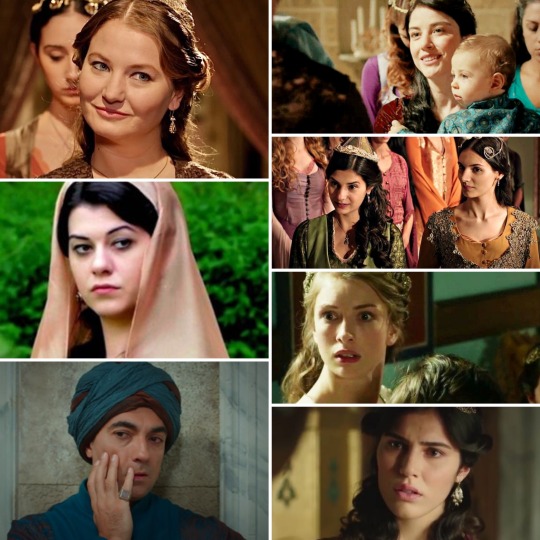
However, there were also characters who were written into the story just for the sake of the drama. Which of these characters was acceptable is up to everyone and feel free to write your opinion about them in a comment here or on another platform! So here's the long-awaited list:
Sadika Hatun
Sadika was a Hungarian woman in the series whose husband was killed by Sultan Suleiman on the day of their wedding. Sadika then became the spy of the Hungarian king, Lajos II and she traveled to Istanbul to personally avenge her husband’s death. Matrakci Nasuh Efendi then, by chance, meets the girl and helps her get into the harem, where she immediately joins Ayşe Hafsa Valide Sultan's service and then becomes Hatice Sultan’s chief servant. During her job, of course, she gets close to Suleiman's bed several times, and then she had the opportunity to attack the sultan. However, she does not succeed, Suleiman survives, and Sadika is thrown in the Bosphorus.
In reality, this story would not be possible at all. Even if we assumed that Sadika really existed and Suleiman actually killed her husband, she would not have been able to get into the Sultan's harem and take revenge. On the one hand, Sadika was already a married woman, an adult woman. Such women could not enter the harem, only virgin, child girls could become the sultan's later concubines. However, even if Sadika had somehow been able to get in the harem, a long education would have awaited her before she could join the Valide Sultan's service. While there may have been some exceptional cases where older or non-virgin women wanted to be gifted to the Sultan, these are special cases. Such was the case, for example, when Hayreddin Barbarossa wanted to kidnap the beautiful Giulia Gonzaga, a widowed Italian noblewoman known far and wide, to send her to the Sultan's harem as a gift. In the end, he didn’t succeed, but even if he did, we don’t know if the sultan would had ever taken the woman to his bed.
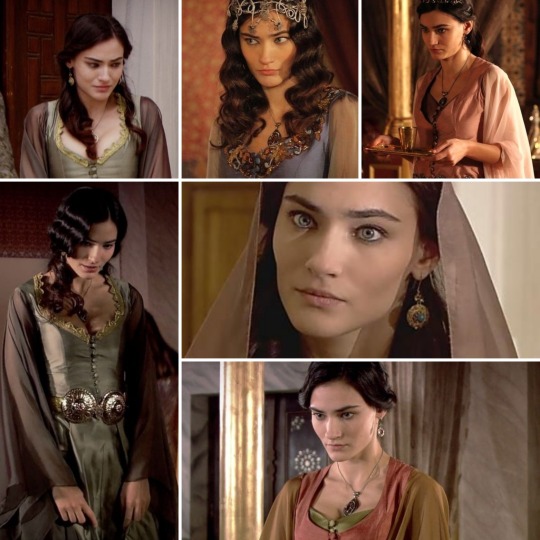
Leo
In the series, he was the love of Hürrem from their youth. Leo came to Istanbul with the goal of finding her former sweetheart. Leo is a talented artist who, with the help of Nasuh Efendi (ahh Nasuh brought all the good people near to the Sultan…) will become the painter of Sultan Suleiman and Pargali Ibrahim. His former relationship with Hürrem will soon be revealed to Pargali Ibrahim, who is thus trying to blackmail Hürrem. Hürrem repeatedly begs Leo to leave the capital, but the man remains, which eventually leads to his death.
In reality, Hürrem - and all the other concubines - were taken into Ottoman captivity as little girls, so it is out of the question that they would have had a love or a fiance. And even if they had, they could never have found them. Nasuh Efendi, though one of the greatest suckers in the series - yet the dearest character - was not like that in reality at all, but he was a wonderful scholar who, by the way, was not so closely friends with either Sultan Suleiman or Pargali Ibrahim.
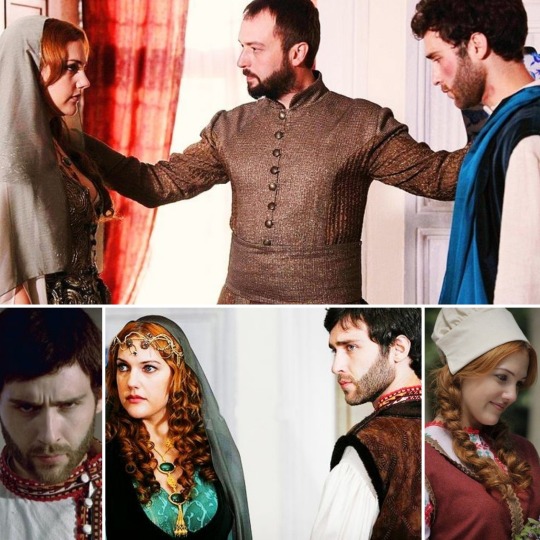
Princess Isabella
Princess Isabella Fortuna was a Spanish noble lady in the series who was on a ship to her future husband, the Austrian prince, when she was captured by Ottoman pirates and was taken to Istanbul to Sultan Suleiman. At first, Suleiman was only interested in the princess for political reasons, but later he fell in love. Princess Isabella initially resisted Suleiman's approach with all her cartilage, but over time she fell in love with the sultan and became his lover. This, of course, Hürrem could not stand and did everything she could to get rid of the princess who was eventually sent home by Suleiman himself.
In reality, of course, such a situation would have been unthinkable. Even assuming that Isabella existed and was captured by pirates, no princess raised in the Catholic faith would have voluntarily become the concubine of a Muslim sultan, she would have committed suicide instead. Let us not forget that Suleiman was loyal to Hürrem from the 1520s onwards, so in reality there was not a single woman who could make hard time for Hürrem during her decades-long relationship with Suleiman. Isabella Fortuna, on the other hand, never existed. Surprisingly, however, they could have patterned her from a real character. There was an Isabella of Castile in this period who was born in 1518 as the child of the widowed Queen of Aragon, Germaine of Foix and Charles V, but she was never captured by Ottoman pirates and was never the bride of the Austrian prince. Isabella's existence was kept secret by her parents all her life, only her mother's testament revealed that she ever existed. It is also known from there that Isabella died young in 1537.
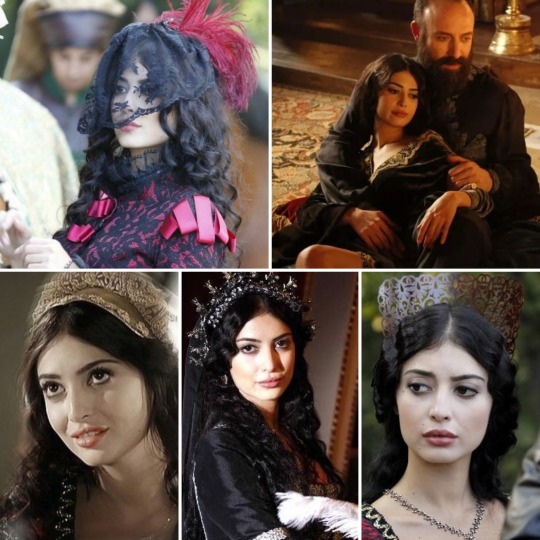
Aybige Hatun
In the series, Aybige was the niece of Ayşe Hafsa, and so the daughter of the Crimean Sahib Giray khan. Aybige originally only came to visit her aunt in Istanbul, but later Hafsa Sultan wanted to see her as the wife of her favorite grandson, Prince Mustafa. However, Aybige was in love with Bali Bey and Mustafa longed for someone else aksi. Bali Bey was eventually almost executed for their love, and Aybige returned to Crimea with her father in the end.
Aybige’s storyline makes mistakes at almost every point. First, Ayşe Hafsa was never the sister of the Crimean khan, so the daughter of the Crimean khan could not have been her niece either. In addition, although Sahib Giray Khan had several daughters, none were called Aybige and none of his daughters ever traveled to Istanbul. The only true point in the whole storyline is that Sahib Giray Khan really collaborated with Sultan Suleiman in his Moldovan war. It is also important to mention Bali Bey at this point. Although Bali Bey was a real historical figure, there is not the slightest match between historical Bali Bey and the series Bali Bey. The real Bali Bey was not a romantic guy who fell in love with every second woman. Bali Bey was a cruel warlord. And if it comes to Bali Bey, let’s say a few words about Prince Mustafa as well. The idea of wanting to marry Mustafa to a khan’s daughter is completely absurd! Since the reign of Sultan Mehmed II, princes have been forbidden to marry anyone, so Prince Mustafa has not been allowed to marry anyone either. And the fact that Suleiman would have supported the idea - even if such a marriage had been able to occurre at all - is an even greater absurdity. Suleiman did not want Mustafa as his heir, so he would never have given him as much power as the support of the Crimean khan.
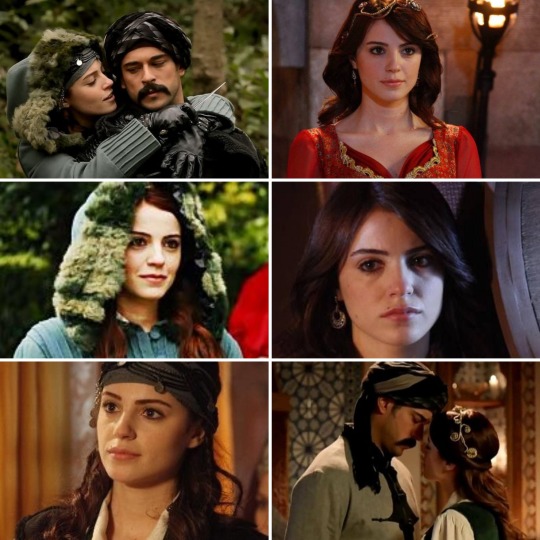
Firuze Hatun
In the series, Firuze was a Persian spy who, with her amazing abilities, was able to heal the pains of the sick Prince Cihangir, earning the love of Hürrem Sultan. Firuze, however, thanked Hürrem kindness in a disgusting way, and became Suleiman's secret lover, whom the sultan fell in love with. In the end, Hürrem was only able to overcome Firuzen with a little, Firuze was eventually exiled from the palace so she could return to Persia.
In reality, Suleiman was loyal to Hürrem, living in a monogamous relationship with her. Even if there was an occasional one-night-stands, Suleiman never fell in love with another woman, only Hürrem. Thus, the Firuze storyline has already failed here. The fact that there was a Persian spy in the harem would have been an interesting suggestion though. There were certainly spies in the royal court of every empire, but they were probably not hiding among the concubines. Eunuchs, for example, moved with much greater freedom, were much better candidates for being a spy…
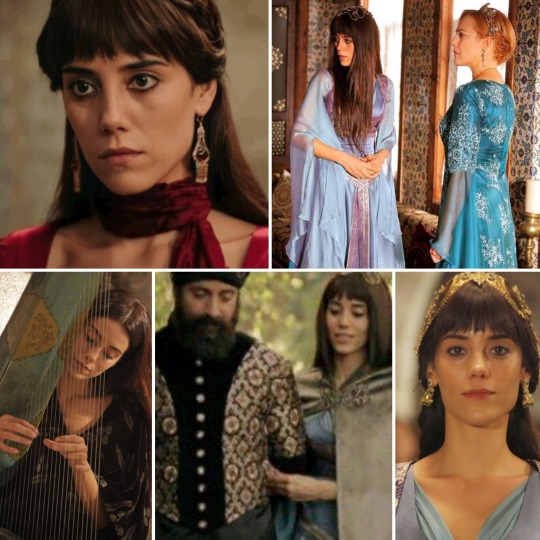
Huricihan Sultan
In the series, Huricihan was the daughter of Ibrahim Pasha and Hatice Sultan, who grew up in the palace of Beyhan Sultan after the death of her parents. From there she returned to Istanbul, where she fell in love with her first cousin, Prince Bayezid. Their love became a relationship and then marriage without the Sultan’s permission. Huricihan became the head of Bayezid's harem and soon her relationship with Hürrem and Suleiman slowly became better. Huricihan's end eventually was brought by Prince Selim's concubine, Nurbanu, who knocked her out in the heat of a dispute, killing her.
In reality, Hatice and Ibrahim Pasha were never married, so they didn't have children either together, so Huricihan never existed. If she had existed, for the reasons already mentioned, it would have been utterly inconceivable for Bayezid to marry her, either secretly or openly. Especially knowing that Bayezid had never had a favourite singled out concubine, as all of his children were born to different women. With a background like this, it’s unlikely he’d ever wanted to marry anyone. Although Hatice Sultan did indeed have a daughter, she was born between 1510 and 1515, so she was well ahead of Bayezid in age, and of course she had nothing to do with the prince and was not even called Huricihan.
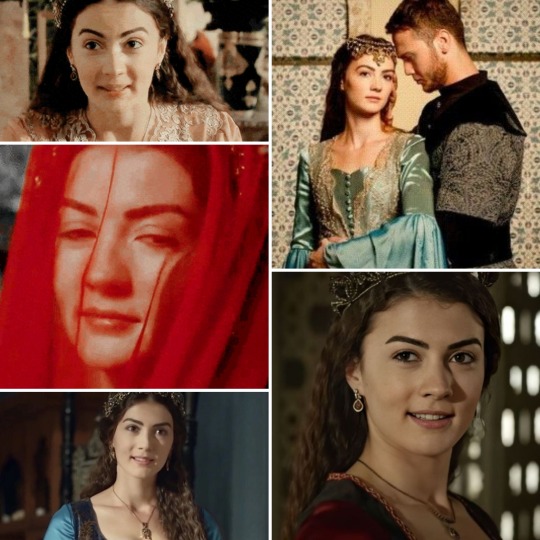
Mihrünissa Hatun
In the series, Mihrünissa was the daughter of Hayreddin Barbarossa the Head of the Fleet, whom her father sent to Prince Mustafa as a consultant. Later, the two young person fell in love with each other and married without the Sultan's knowledge. In time, Mihrünissa also gave birth to Mustafa's son Mehmed. After Prince Mustafa and his son Mehmed were executed, Mihrünissa went to the capital and cut her own throat before Hürrem's eyes.
In reality, for the reasons already detailed several times above, no prince could marry anyone, so Mustafa also never married. In addition, Barbarossa never had a daughter named Mihrünissa and Hayreddin Pasha was never a supporter of Prince Mustafa. However, even assuming that Mihrünissa existed, there is no chance that she could have committed suicide before Hürrem's eyes. Prince Mustafa's harem retired to Bursa, so that no member of the harem could travel to the capital, especially not to the palace and kill herself in front of Hürrem. So, in fact, the Mihrünissa storyline was just 100% fiction.
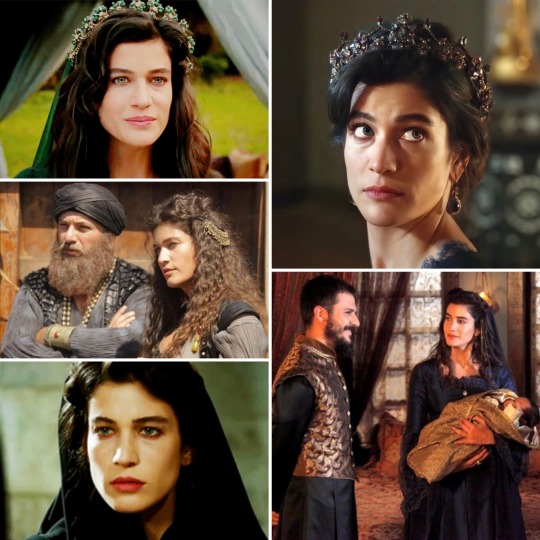
Nazenin Hatun
In the series, Nazenin arrived in Istanbul with Nurbanu, where Hürrem, who was struggling with menopause, sent her to the sultan herself. Nazenin thus became the sultan's concubine and soon gave birth to a daughter, Raziye Sultan. Eventually, on Hürrem's instructions, she was killed by Nurbanu.
In reality, as I have said many times, Suleiman was loyal to Hürrem. In addition, after the birth of Prince Cihangir in 1531/2, Suleiman had no more children, neither to Hürrem nor to anyone else. It is true that he had a daughter named Raziye, however, the child died in 1520 at the age of a few years as a result of an epidemic.
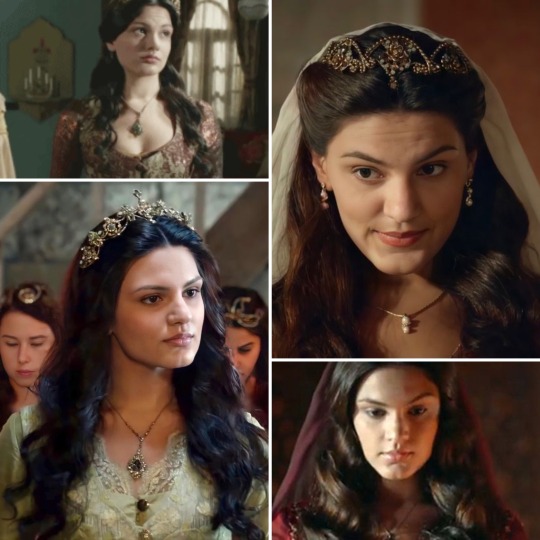
Surprising realities
After many fictional characters, one would think that all eunuchs and kalfas were fictional characters, as we know quite a bit about the harem. However, this is not true! There were some historically inspired characters, such as Gazanfer Agha, who, although existed and was one of the most influential eunuchs ever, was not a loyal man of Nurbanu, but Sultan Selim II. Gazanfer reached the peak of his career, by the way, during the reign of Safiye Sultan.
Similarly historical was Canfeda Hatun, who was Nurbanu’s most loyal servant and one of the most influential kalfas of her era. True, Canfeda’s character in the series was a fusion of two loyal servants of historic Nurbanu. In her young age, in the princely harem of Selim, Nurbanu became acquainted not with Canfeda but with another kalfa, who remained her faithful servant for the rest of her life. Canfeda only became Nurbanu’s main supporter during Selim’s reign.
Like them, Afife Hatun’s character was partly real also. Sultan Suleiman's wetnurse was really called Afife and the sultan always kept in touch with the woman. However, Afife Hatun never moved to Istanbul to rule the Sultan’s harem, but lived a simple life.
Gracia Mendes Nasi was introduced last season as a wealthy Portuguese Jewish woman who helped Portuguese refugees get to Istanbul. Later, Gracia became the lover of Grand Vizier Rüstem Pasha, which made her an enemy of Mihrimah Sultan. In reality, Gracia Mendes was a very benevolent soul who was committed to Jewish traditions and her Jewish brothers. She was never a lover of Rustem and an enemy of Mihrimah. However, like the series, Gracia actually enjoyed the Sultan’s support and, with his help, she made great improvements in Istanbul’s Jewish Quarter and helped many refugees start a new life in the Ottoman Empire.
One of the most interesting guest actors of the last season of the series was Anna Jagello, the daughter of the former King of Poland, the sister of the new King of Poland. Although the woman was a real historical figure, the historical Anna never traveled to Istanbul and never corresponded with Hürrem Sultan. However, Hürrem exchanged letters several times with Anna's mother Bona Sforza, Anna's father, King Sigismund I of Poland, and Anna's brother, the later Zsigmond Ágost II king of Poland, and even Anna's sisterm Isabella, the Hungarian queen. Thanks to the intercession of Hürrem, the relationship between the Kingdom of Poland and the Ottoman Empire was quite good and almost friendly during Suleiman's reign.
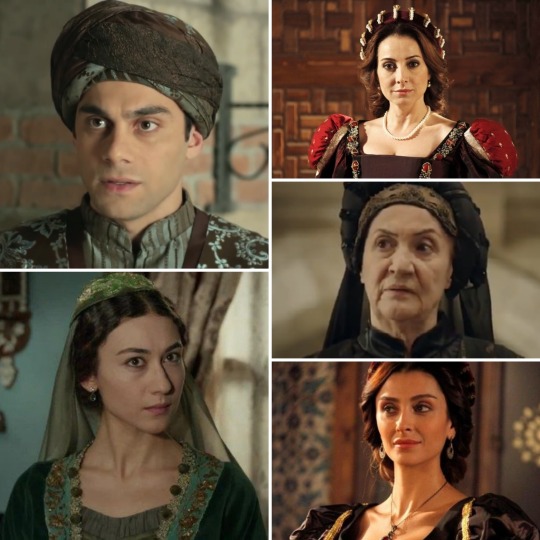
* * *
Egy kis karácsonyi meglepetés poszt következik. Youtube-on az egyik legnépszerűbb videóm az volt, amelyben a nem történelmi karaktereket gyűjtöttem össze, elmagyarázva, mennyire voltak kitaláltak, mennyire volt mögöttük egy-egy valós történelmi személy, mint ihlető. Most karácsony alkalmából szeretném nektek összefoglalni a Muhteşem Yüzyil sorozat főbb kitalált karaktereit és történetüket.
A Muhteşem Yüzyil sorozatban több kitalált karakter is jelen volt, sokan már az első percektől kezdve. Egyes kitalált karakterek jelenléte megbocsátható volt, hiszen nagyon kevés részlet maradt ránk a Szulejmán háremében jelenlévő személyekről. Így például Sümbül Aga, Gül Aga, Mercan Aga és más eunuchok karakterei bár nem valódi személyeket keltenek életre, szükségesek voltak a sorozat dramaturgiája szempontjából. Sümbül karaktere volt a legfontosabb az eunuchok között és talán emiatt sokan gondolhatjuk úgy, hogy Hürremnek a valóságban is volt egy ilyen közeli barátja a fő eunuch személyében. Azonban ez nem igaz. Szulejmán uralkodása alatt rengeteg főeunuch váltotta egymást és egyikről sem ismert, hogy különösebben közel álltak volna Hürremhez. Hürrem közeli szolgálói közül csupán egy ismert név szerint, egy Nevbahar nevű nő. Sümbülhöz hasonló volt Nigar Kalfa, Gülsah Hatun, Fidan Hatun, Daye Hatun, Fahriye Kalfa karaktere is. Egyikük sem valós személy volt, ám bizonyosan minden szultánának megvoltak a saját megbízható szolgálói, ahogy ezt a sorozatban is mutatták. Hasonlóan az eunuchokhoz és kalfákhoz megbocsátható füllentésnek tekinthetőek Musztafa herceg és Bayezid herceg ágyasai is, Ayşe, Rana, Defne vagy Rumeysa Hatun. A két herceg asszonyairól ugyanis semmit sem tudunk, egyiküknek sem volt kiemelt jelentőségű főágyasa, gyermekeik más-más nőktől születtek.
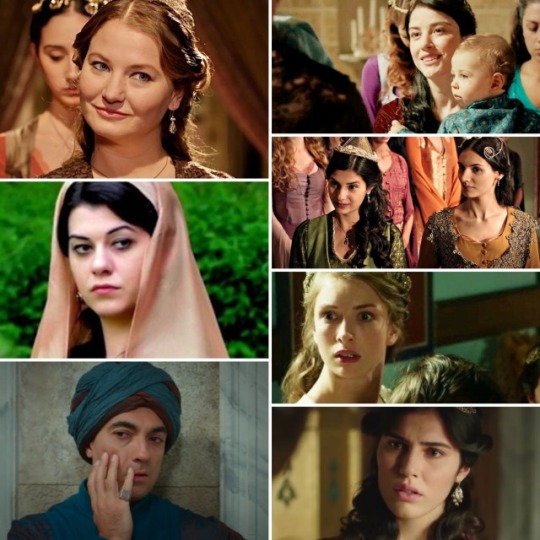
Voltak azonban olyan karakterek is, akiket csupán a dráma kedvéért írtak bele a történetbe. Az, hogy ezek közül melyik karakter mennyire volt elfogadható, azt mindenki maga döntse el és nyugodtan írja meg kommentben itt vagy más platformon, hogy mit gondol róluk! Következzék hát a várva várt lista:
Sadika Hatun
Sadika a sorozatban egy magyar nő volt, akinek férjét az esküvőjük napján megölte Szulejmán szultán. Sadika ezek után a magyar király, II. Lajos parancsára Isztambulba utazott, hogy ott személyesen bosszulja meg férje halálát. Matrakci Nasuh Efendi aztán egy véletlen folytán megismerkedik a lánnyal és segít neki bekerülni a hárembe, ahol azonnal Ayşe Hafsa Valide Sultan szolgálatába áll, majd Hatice Sultan főszolgálója lesz. Menetközben természetesen többször is Szulejmán ágyának közelébe kerül, majd lehetősége nyílik a szultánra támadni. Azonban nem jár sikerrel, Szulejmán életben marad, Sadikát pedig a Boszporuszba fojtják.
A valóságban ez a történetszál egyáltalán nem lenne lehetséges. Ha feltételeznénk is azt, hogy Sadika valóban létezett és Szulejmán valóban megölte a férjét, akkor sem állt volna módjába bejutni a szultáni hárembe és bosszút állni. Egyrészt Sadika férjezett asszony volt már, felnőtt nő. A hárembe nem kerülhettek be ilyen nők, csupán szűz, gyermeklányokból válhattak a szultán ágyasai. Mindazonáltal ha Sadika valahogy mégis bekerült volna a hárembe hosszadalmas oktatás várt volna rá, mielőtt a Valide Sultan szolgálatába állhatott volna. Előfordulhatott ugyan néhány kivételes eset, amikor idősebb vagy nem szűz nőket akartak volna a szultánnak ajándékozni, azonban ezek különleges esetek. Ilyen volt például, amikor Hayreddin Barbarossa el akarta rabolni a messze földön ismert, gyönyörű Giulia Gonzagát, megözvegyült itáliai nemesasszonyt, hogy a szultán háremébe küldje ajándéknak. Végül nem járt sikerrel, ám ha sikerrel járt volna is, nem tudni, hogy a szultán valaha is ágyba vitte volna-e a nőt.
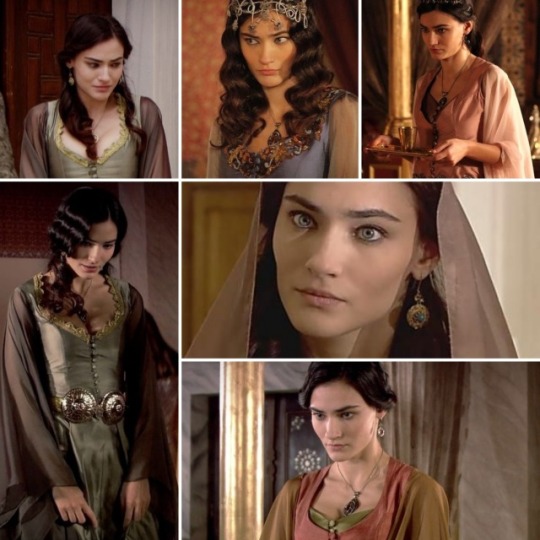
Leo
A sorozatban Leo Hürrem fiatalkori szerelme volt, aki azzal a céllal érkezett Isztambulba, hogy megtalálja egykori kedvesét. Leo tehetséges művész, aki Nasuh Efendi segítségével (ahh Nasuh csupa jó embert juttatott a szultán közelébe…) Szulejmán szultán és Pargali Ibrahim festője lesz. Egykori viszonya Hürremmel hamarosan kiderül Pargali Ibrahim számára, aki ezzel próbálja zsarolni Hürremet. Hürrem többször könyörög Leonak, hogy hagyja el a fővárost, de a szerelmes férfi marad, ami végül halálához vezet.
A valóságban Hürrem – és minden más ágyas – még kislányként került oszmán fogságba, tehát kizárt, hogy szerelmük vagy vőlegényük lett volna, ha pedig mégis, az sosem tudott volna rájuk találni. Nasuh Efendi, pedig aki a sorozat egyik legnagyobb baleke – ugyanakkor legkedvesebb karaktere – a valóságban egyáltalán nem ilyen volt, hanem egy csodálatos tudós, aki egyébként nem állt ilyen közeli barátságban sem Szulejmán szultánnal, sem Pargali Ibrahimmal.
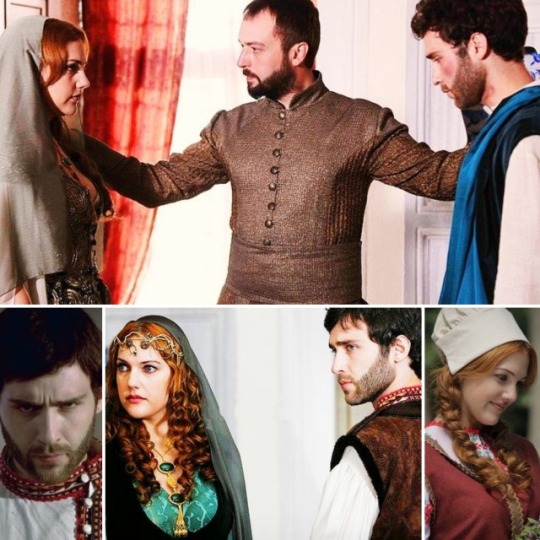
Izabella Hercegnő
Izabella Fortuna hercegnő a sorozatban egy spanyol nemes hölgy volt, aki éppen jövendőbeli férjéhez, az osztrák herceghez tartott hajón, mikor az oszmán kalózok elragadták és Isztambulba vitték Szulejmán szultán elé. Először Szulejmán politikai okokból érdeklődött csupán a hercegnő iránt, később azonban beleszeretett. Izabella hercegnő eleinte minden porcikájával ellenállt Szulejmán közeledésének, idővel azonban beleszeretett a szultánba és a szeretője lett. Ezt természetesen Hürrem szultána nem állhatta és mindent megtett, hogy megszabaduljon a hercegnőtől, akit végül Szulejmán küldött el.
A valóságban természetesen elképzelhetetlen lett volna egy ilyen szituáció. Ha feltételezzük is, hogy Izabella létezett és a kalózok fogságába esett, egyetlen katolikus hitben nevelt hercegnő sem vált volna szabad akaratából a szultán ágyasává, előbb lett volna öngyilkos. Azt se felejtsük el, hogy Szulejmán az 1520-as évektől kezdve hűséges volt Hürremhez, a valóságban nem volt egyetlen nő sem, aki éket verhetett volna közéjük több évtizedes kapcsolatuk alatt. Másrészről pedig Izabella Fortuna sosem létezett. Meglepő azonban, hogy valós karakterről mintázhatták. Létezett egy Kasztíliai Izabella ebben a korban, aki 1518-ban született az özvegy aragóniai királyné Germaine Foix és V. Károly gyermekeként, azonban sosem esett oszmán kalózok csapdájába és sosem volt az osztrák herceg menyasszonya. Izabella létezését egész életében titokban tartották szülei, csupán édesanyja végrendeletéből derült fény arra, hogy valaha is létezett. Innen tudni azt is, hogy Izabella fiatalon elhunyt 1537-ben.
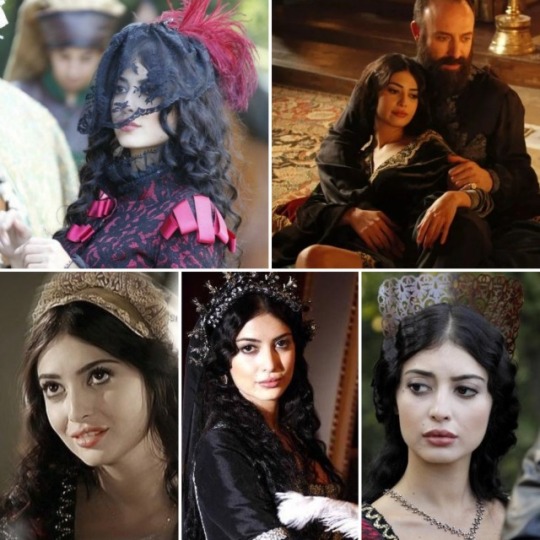
Aybige Hatun
A sorozatban Aybige Ayşe Hafsa Sultan unokahúga volt, a krími Sahib Giray kán lánya. Aybige eredetileg csak látogatóba érkezett Isztambulba, később azonban nagynénje szerette volna őt kedvenc unokája, Musztafa herceg feleségeként látni. Aybige azonban Bali Bégbe volt szerelmes és Musztafa is más után vágyakozott. Bali Béget végül majdnem kivégezték a szerelmük miatt, Aybige pedig apjával visszatért a Krímre.
Aybige történetszála szinte minden létező ponton hibádzik. Először is, Ayşe Hafsa sosem volt a Krími kán testvére, tehát a krími kán lánya sem lehetett az unokahúga. Emellett Sahib Giray kánnak bár több lánya volt, egyiket sem hívták Aybigének és egyik lánya sem utazott sosem Isztambulba. Az egész történetszál egyetlen igaz pontja, hogy Sahib Giray kán tényleg együttműködött Szulejmán szultánnal annak moldáv háborújában. Fontos megemlíteni ezen a ponton Bali Béget is. Bali Bég bár valós történelmi személy volt, de a legkisebb egyezés sincs a történelmi Bali Bég és a sorozat Bali Bége között. A valódi Bali Bég nem egy romantikus fickó volt, aki minden második nőbe beleszeretett, és akiért bolondultak a nők. Bali Bég egy kegyetlen hadvezér volt. És ha már Bali Bég szóba jött, ejtsünk néhány szót Musztafa hercegről is. Az ötlet, hogy Musztafát egy kán lányához akarják adni teljesen abszurd! II. Mehmed szultán uralkodása óta tilos volt a hercegeknek házasságot kötni, így Musztafa herceg sem köthetett senkivel házasságot. Az pedig, hogy Szulejmán támogatta volna az ötletet, már ha egyáltalán felmerült volna egy ilyen házasság, még nagyobb abszurdum. Szulejmán nem Musztafát akarta örökösének, így sosem adott volna a kezébe akkora hatalmat, mint a krími kán támogatása.
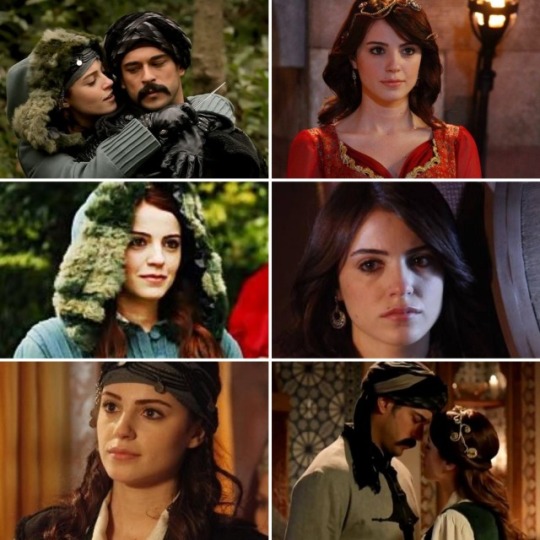
Firuze Hatun
A sorozatban Firuze egy perzsa kém volt, aki csodálatos képességeivel gyógyítani tudta a beteges Cihangir herceg fájdalmait, amivel kiérdemelte Hürrem szeretetét. Firuze azonban rút módon hálálta meg Hürrem kedvességét, ugyanis Szulejmán titkos szeretője lett, akibe a szultán halálosan beleszeretett. Végül Hürrem csak egy hajszállal volt képes felülkerekedni Firuzén, akit végül száműztek a palotából, így visszatérhetett Perzsiába.
A valóságban Szulejmán hűséges volt Hürremhez, monogám kapcsolatban éltek. Ha előfordult is alkalomadtán egy-egy egyéjszakás kaland, Szulejmán soha nem szeretett bele más nőbe, csak Hürremet szerette. Így a Firuze történetszál már itt el is bukott. A tény, hogy Firuze perzsa kém lett volna érdekes felvetés, bizonyára akadtak kémek minden birodalom királyi udvarába, azonban ők valószínűleg nem az ágyasok között rejtőztek. Az eunuchok például, sokkal nagyobb szabadsággal mozogtak, sokkal könnyebben lefizethetők voltak…
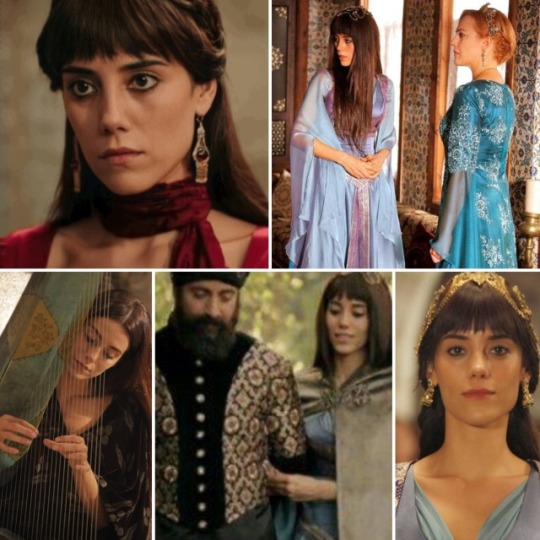
Huricihan Sultan
A sorozatban Huricihan Ibrahim Pasa és Hatice Sultan lánya volt, aki szülei halála után Beyhan Sultan palotájában nevelkedett. Onnan tért vissza Isztambulba, ahol beleszeretett elsőunokatestvérébe, Bayezid hercegbe. Szerelmükből kapcsolat, majd házasság lett a szultán engedélye nélkül. Huricihan Bayezid háremének feje lett és kapcsolata lassanként rendbejött Hürremmel és a szultánnal is. Huricihan végzete végül Szelim herceg ágyasa, Nurbanu lett, aki egy vita hevében leütötte őt, ezzel megölve.
A valóságban Hatice és Ibrahim Pasa sosem voltak házasok, így gyermekük sem született, tehát Huricihan sosem létezett. Ha létezett volna is, a már korábban említett okokból teljesen elképzelhetetlen lett volna, hogy Bayezid feleségül vegye őt akár titokban, akár nyíltan. Különösen tudva, hogy Bayezidnek nem volt sosem kiemelt ágyasa, minden gyermeke más nőtől született. Ilyen háttérrel nem valószínű, hogy valaha is feleségül akart volna venni bárkit. Hatice Sultannak bár valóban volt egy lánya, az 1510-1515 között született, így korban jóval megelőzte Bayezidet, és természetesen sosem volt semmi köze a herceghez és nem is Huricihannak hívták.
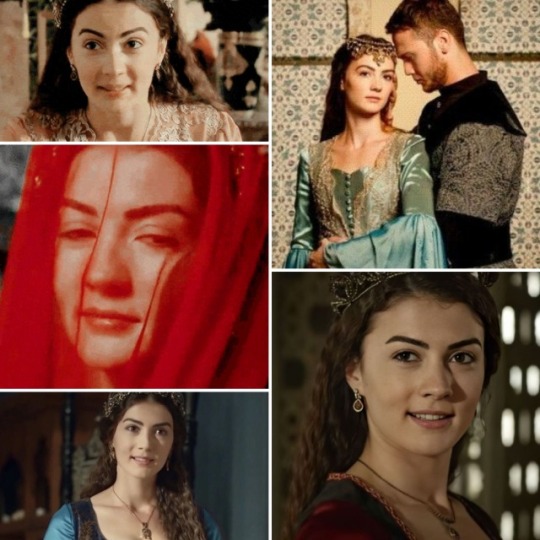
Mihrünissa Hatun
A sorozatban Mihrünissa Hayreddin Barbarossa flotta parancsnok lánya volt, akit édesapja küldött Musztafa herceg mellé tanácsadónak. Később a két fiatal egymásba szeretett és a szultán tudta nélkül egybe keltek. Idővel Mihrünissa életet adott Musztafa fiának, Mehmednek is. Miután Musztafa herceget és vele együtt fiát, Mehmedet is kivégezték, Mihrünissa a fővárosba ment és Hürrem szeme láttára elvágta a saját torkát.
A valóságban a már fent többszörösen részletezett okok miatt egy herceg sem köthetett házasságot, így Musztafa sem nősült meg soha. Emellett Barbarossának sosem volt Mihrünissa nevű lánya és Hayreddin Pasa sohasem volt Musztafa herceg támogatója. Ha azonban feltételeznénk is, hogy Mihrünissa létezett, nincs arra esély, hogy Hürrem szeme láttára lehetett volna öngyilkos. Musztafa herceg háreme Bursába vonult vissza, így a hárem egyik tagja sem utazhatott egyetlen percre sem a fővárosba, nemhogy a palotába, Hürrem elé. Így tulajdonképpen a Mihrünissa történet-szál 100%-ban kitaláció volt.
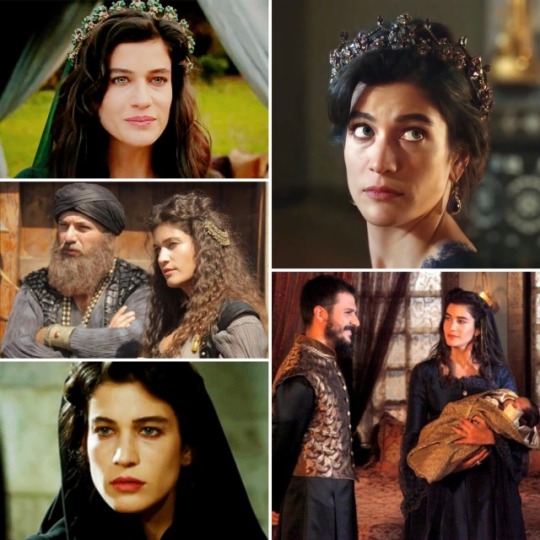
Nazenin Hatun
A sorozatban Nazenin Nurbanuval együtt érkezett Isztambulba, ahol aztán a menopauzával küszködő Hürrem maga küldte őt a szultán elé. Nazenin így a szultán ágyasa lett és hamarosan egy lánygyermeknek, Raziye Sultannak adott életet. Végül Hürrem utasítására Nurbanu ölte meg.
A valóságban, mint már sokszor mondtam, Szulejmán hűséges volt Hürremhez. Emellett Cihangir herceg 1531/2-es születése után Szulejmán nem nemzett több gyermeket, sem Hürremnek sem másnak. Az igaz, hogy volt egy Raziye nevű kislánya, azonban a gyermek 1520-ban néhány éves korában elhunyt egy járvány következtében.
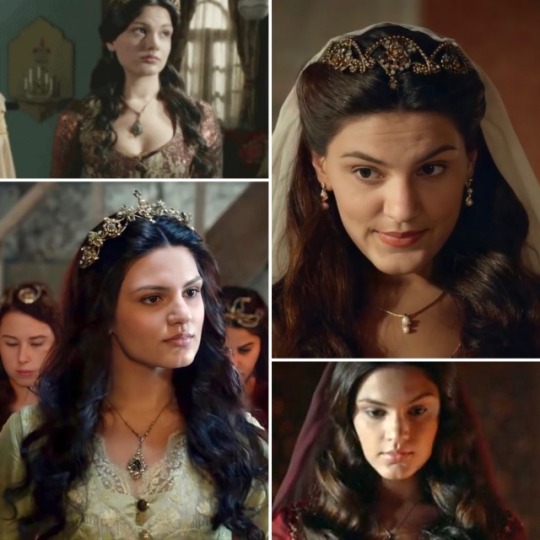
Meglepő valóságok
A sok kitalált karakter után azt gondolhatnánk, hogy az összes eunuch és kalfa kitalált karakter volt, hiszen meglehetősen keveset tudunk a háremről. Azonban ez nem igaz! Volt néhány történelmi ihletésű karakter, mint például Gazanfer Aga, aki bár létezett, és a valaha volt egyik legbefolyásosabb eunuch volt, nem Nurbanu hű embere volt, hanem II. Szelim szultáné. Gazanfer pályája csúcsát egyébként Safiye Sultan uralkodása alatt érte el.
Hasonlóan valós volt Canfeda Hatun is, aki Nurbanu leghűségesebb szolgálója volt és az egyik legbefolyásosabb kalfája korának. Igaz, Canfeda sorozatbeli karaktere, a történelmi Nurbanu két hűséges szolgálójának ötvözéseként született meg. Nurbanu fiatal korában, Szelim hercegi háremében nem Canfedával, hanem egy másik kalfával ismerkedett meg, aki élete végéig hűséges szolgálója maradt. Canfeda csak Szelim uralkodása alatt került képbe és vált Nurbanu fő segítőjévé.
Hozzájuk hasonlóan Afife Hatun karaktere is részben valós volt. Szulejmán szultán szoptatósdajkáját tényleg Afifének hívták és a szultán mindig tartotta a kapcsolatot az asszonnyal. Azonban Afife Hatun sosem költözött Isztambulba, hogy irányítsa a szultáni háremet, hanem egyszerű életet élt.
Gracia Mendes Nasi az utolsó évadban került bemutatásra, mint gazdag portugál zsidóasszony, aki portugál menekülteknek segített Isztambulba jutni. Később Gracia a nagyvezír Rüsztem Pasa szeretője lett, aminek köszönhetően szembe került Mihrimah szultánával. A valóságban Gracia Mendes igen jótét lélek volt, aki elkötelezett volt a zsidó hagyományok és zsidó testvérei iránt. Sosem volt Rüsztem szeretője és Mihrimah ellensége. Azonban a sorozathoz hasonlóan, Gracia a valóságban is élvezte a szultán támogatását és segítségével nagy fejlesztéseket vitt véghez Isztambul zsidó negyedében és nagyon sok menekültnek segített új életet kezdeni az Oszmán Birodalomban.
A sorozat utolsó évadának egyik legérdekesebb vendégszereplője Jagelló Anna volt, az egykori lengyel király lánya, az új lengyel király testvére. Bár az asszony valós történelmi személy volt, a történelmi Anna sosem utazott Isztambulba és sosem levelezett Hürrem szultánával. Azonban Hürrem többször is váltott levelet Anna édesanyjával Bona Sforzával, Anna édesapjával, I. Zsigmond lengyel királlyal, valamint Anna testvérével, a későbbi II. Zsigmond Ágost lengyel királlyal, sőt Anna másik testvérével Izabella, magyar királynővel is. Hürrem közbenjárásának köszönhetően Szulejmán uralkodása alatt meglehetősen jó, szinte baráti volt a viszony a Lengyel Királyság és az Oszmán Birodalom között.
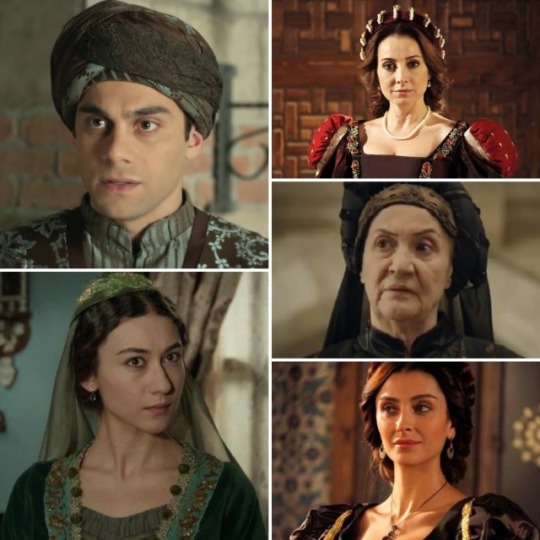
#selim ii#gazanfer agha#gazanfer#suleiman the magnificent#safiye sultan#suleiman i#suleyman i#haseki hürrem sultan#hürrem sultan#nurbanu sultan#aybige hatun#ayse hafsa#ayse hafsa sultan#princess isabella#firuze#firuze hatun
101 notes
·
View notes
Photo






#muhtesem yuzyil#magnificent century#mehmet gunsur#sehzade mustafa#efsun hatun#nora hatun#rumeysa#helena hatun#fatma hatun
24 notes
·
View notes
Text
Hafız Öğrenciye Çeyrek Altın Hediyesi
Hafız Öğrenciye Çeyrek Altın Hediyesi
İlçe Müftümüz Ramazan AVCI Kuranın indirildiği Ramazan ayında hafızlığını tamamlayan Nene Hatun Kuran Kursu öğrencimiz Rumeysa DÖNMEZ’i evinde ziyaret etti. Anne babasının nezaretinde çeyrek altın takdim ederek öğrencimizi tebrik etti. Rabbim kendisinden ailesinden hocalarından ve Kuran Kurslarımıza maddi ve manevi katkıda bulunan emeği geçen herkesten Allah razı olsun.

View On WordPress
0 notes
Text
You are not wrong. Ayşe Hatun, along with S03 Rumeysa, is nowhere to be seen after E98 or so. If there has to be an in-universe explanation outside of the sloppy writing, I headcanon that she has died somewhere around the time-skip between S03 and S04 and this is why Nergisşah looks up to Mahidevran (and Mihrünnisa) so much.
Am I crazy, or does Nergissah's mom, Ayse, just disappear? I don't remember anything happening to her but we don't see her when her daughter is grown up.

19 notes
·
View notes
Note
Rumeysa hatun + gifs?
sorry anon we’re not accepting gif requests at the moment but you can contact the mods individually to see if they are.
4 notes
·
View notes
Text




This sheer blue kaftan was first worn by Princess Isabella Fortuna in the thirteenth episode of the second season of Magnificent Century. It is briefly worn again by Fatma Hatun in the twenty-sixth episode of the same season. The kaftan makes another appearance on Rümeysa Hatun in the thirty-first episode of the third season. It is worn one more time by Sultan Selim I's and Nurbanu Sultan's daughter Şah Sultan in the thirty-sixth and final episode of the fourth season.
#Muhteşem Yüzyıl#Magnificent Century#period drama#costume drama#historical drama#Isabella Fortuna#Fatma Hatun#Rümeysa Hatun#Rumeysa Hatun#Şah Sultan#Sah Sultan#Şah Sultan (Daughter of Nurbanu)#reused costumes#recycled costumes
13 notes
·
View notes
Note
hi!! it's me again. what are your thoughts on how this franchise portrays harem drama? personally, i think they totally wasted the heck out of this premise. you have this place full of women with a very similar trauma, but who are all supposed to compete with each other! perfect for very juicy dynamics and conflicts. the show only does... Mahidevran vs Hurrem. over and over again.
Eh, depends on what you classify as "harem drama". Struggle for power? Complex scheming with plans within plans that fucking Dune pales in comparison to? Girlies starting MINI SLAVE REVOLTS?! Yeah, give me that shit NOW. It can get a little repetitive at times, but it's never boring. When the goal is to just get the guy, it's largely underwhelming and annoying. If only all of it was indeed like Mahidevran vs. Hürrem, because they at least have the juicy long-time struggle, like, they are each other's fucking nemesis, and eventually it's not even about the guy, but about power and survival of their sons.
The Gülnihal drama was only interesting because of the impact on their friendship and because she was more than a one-dimensional enemy for Hürrem to "slay" by killing her or having sex with Süleyman. The Russian concubines were the pointless bullshit ever and also gave us the scene of Hürrem's self-harm, thanks I hate it. And thank God, her rivalry with Hürrem was never a big part of Sadika's storyline, which is why I loved it so much (well, that and of course the fact that the main point of it was shanking Süleyman, even if her mission was ultimately unsuccessful).
Isabela Fortuna was wasted af, like, imagine the good shit this might've been if it was actually focused on her escape attempts and relationship with Süleyman in ways that aren't just Stockholm syndrome. Also, her rivalry with Hürrem sucked. Like, bitch, why are you attacking this girl?! She doesn't want to sleep with Süleyman any more than you want her to! Then there are the two chicks in season 2 that Süleyman didn't even look at before sending them away, again kinda wasting our time.
Firuze... *sigh* I know some of y'all like this storyline and are able to find something good and worthwhile in it. Good for you. Because I personally couldn't stand it. I really don't get what Süleyman sees in this chick, like I am pretty sure he's just getting off on Hürrem's anger and despair. Or maybe he's sleeping with her just to see how he'd like a girl that isn't an insufferable drama queen for once. I don't know, because the show doesn't answer this most interesting of questions. So instead the whole thing devolves into an endless catfight that distracts us from Ibrahim's eminent demise, which is kind of a problem, since I've been looking forward to Ibrahim's death for the entire previous season. Thanks, I hate it.
Nazenin is just there, because Fatma thinks it's funny to make Hürrem suffer. She also says something about a prince, but that part of her plan was always kinda dumb. Nazenin is annoying and I hate her, but I like Fatma, so in the end it just ends up being less bad than the other ones, but still not good.
I will say, Fatma Hatun's quest to fuck Mustafa was very entertaining at first, but then he shuns her for a more stable girl and the whole thing devolves into the predictable yandere bullshit that I hate so much. I mean, this is Fatma, some yandereing is to be expected, but for it to be the focus of her character? No. Fuck you. Also, Fatma and Nurbanu are the only two women who are in any way skilled in the art of getting into man's pants. Also, Firuze, kinda. Others either use super crude methods (dancing, or boob touching - hi Efsun) or just are themselves, which don't get me wrong, that's often quite enough, but still, it's more fun for us as viewers when they get creative. I complained endlessly about Rumeysa and Ayşe's whole thing, and I don't think it gets any better later. Also, it's pointless af. Thanks, I hate it.
Reyhan or whatever her name is is the most boring part of Nurbanu's whole existence and I hate her. Like, Nurbanu is seriously on a whole another level from this bitch, no wonder she is just shoved into the background untill the murder attempt.
Kaya only exists to explain Bayezit's older kids and for Huricihan to be horrible to. I hate both of them.
Mahfiruz the Greek was horrible, but kinda clever, which means she had potential against the scrappy little thing like Anastasia. I also liked Sayeşte's storyline... So of course they had to kill both of them and bring in Mahfiruze the Circassian, the most annoying bitch in the universe. Katerina was there to be sexy and threatening, and was supremely bad in both. Nazenin was easier to take seriously. But Yasemin takes the cake for the biggest waste of a character. Like can you imagine, her and Kösem learning they are sisters?! The drama?! The joy in what was to be joyless times for Kösem?! But nooo, she had to be killed to... Show us what a monster Safiye is? As if we haven't just seen an entire season of that?! Fuck off with that.
The Osman-Meleksima-Akile thing again never went anywhere, why didn't they just cut Akile entirely is beyond me. Like, it's not like they are averse to that - they did cut a lot of superfluous children of the sultans.
I haven't seen the entirety of season 2 of Kösem, but I will say this - getting me to care who gets the privilege of being in an utterly terrible relationship with Murat is a doomed endeavour, and it sure as hell isn't made any easier by Farya and Ayşe being boring and terrible respectively.
26 notes
·
View notes
Photo






(Almost) Every Costume Per Episode + Rumeysa’s white gown with orange kaftan in 3x35
#Muhteşem Yüzyıl#Magnificent Century#mcedit#perioddramaedit#weloveperioddrama#period drama#perioddrama#Rumeysa Hatun#Muhtesem Yuzyil#wspaniałe stulecie#Getting a Divorce#costumeedit#costumes#costume edit#costume drama#costume set#costume series#Almost Every Costume Per Episode#historical drama#Awkward-Sultana
55 notes
·
View notes
Note
I can tell you adore Mahidevran, so I need to ask. Between all of her kalfas (Gulsah, Fatma, Fidan, Diana/Fahriye), who did you prefer and who do you think she had the strongest relationship with?
Ahh, yes, I adore her so much! 😊 Thank you for the question, because I find this topic very interesting and I've always wanted to cover it. (that's why, along with my favourite relationship, I'll go through them all.)
The relationships Mahidevran had with her kalfas/servants are consistently determined by boundless loyalty and ability to be relied on in every case. And that's normal, because it's what's expected in the system and her role as a sultana where every mistake has the chance to put you in a dangerous position, even if it's out of your sole control. However, these relationships evolve as she evolves in many different ways and I don't feel she treats her servants all that badly as the fanbase makes it out to be at times. They play a role in humanizing her just like her other positive relationships and she has her fair share of soft moments with them.
My vote for Mahidevran's best relationship with a kalfa (also my personal favourite character of the bunch) goes to Fidan. She represents the best of Mahidevran's newfound calmness and levity in later seasons - it's perhaps her most "mellow" relationship. It's also the most prominent one since Gülşah, which adds even more points. Mahidevran and Fidan get closer with time. First they didn't have much of a base where she was in Hürrem's party at first (though she still shared more scenes with Gül Aga than her) and then Gülşah and Fatma overshadowed her role, but afterwards it was clear how much they respected and trusted each other. The loyal aspect of such relationship certainly played the strongest with Fidan - while following Mahidevran's every order and always doing her duties faithfully without a second thought, she was this devoted to Mahidevran to the point I feel a part of her shared her principles for following tradition (as seen with both Fatma and Ayşe Hatun) and didn't want to leave her when she was in poverty and offered her to leave herself in order to find a better life. Fidan loved Mahidevran so much she assured her she didn't have any fault in E105 and asked her how did she forgive Hürrem after everything. Mahidevran hasn't really been that cordial with her servants for a long time, that's why Fidan was such a big step for her: she finally found one who would be always by her side, one she could fully trust and share everything with. And Mahidevran knew it well, especially by the end of S03 and the whole S04: she entrusted her to be her baş kalfa until the end, Fidan was the only one who knew about her plan for Mehmet, they both went to the woman who gave the fortune amulet for Mustafa in E123. They worked together and it showed, in more harmony than Mahidevran's other relationships of this kind. They complemented each other so well with their gained and present emotional maturity. There barely were problems between them, except for them disagreeing about Rumeysa in E96 and some moments where Fidan made grave mistakes (like losing the trails of the spy in E78). Fidan knew Mahidevran well, being aware and sympathetic of all her experiences, while demanding respect for her of the others in the harem in a way that doesn't harm her. Fidan is the servant Mahidevran has been the most lenient to, while demanding the necessary amount of loyalty.
Admittedly, I find Mahidevran's relationship with Gülşah interesting, in spite of its toxicity. They begin with years of experience together and it's perhaps the relationship where Mahidevran expresses her vulnerability and desires most openly, at least at first. Gülşah is clearly dedicated to her sultana, even if in a very unhealthy way: she ties Mahidevran's wishes to her own to the point what Gülşah wants automatically becomes what Mahidevran needs in her eyes, no matter that her mistress may tell her the opposite. Gülşah's excuse is always that she does everything for her sultana's own good, but she actually clings to her selfish impulses more often than not. When Mahidevran told her numerous times not to act against Hürrem, Gülşah felt she must at all costs do so, even in secret, when she was the one offended, knowing that Mahidevran may not want it now, but that life would be better for them both when it's done anyway. And it's a pattern that is followed with many actions of Gülşah's before and afterwards, making the loyalty to Mahidevran disappear more and more, without Gülşah actually realizing it. I get why she would want to go for this stuff: outside of Mahidevran, Gülşah doesn't have anyone, really - she's usually mocked in the harem by Nigar, Sümbül, Gül and even Şeker Aga or Daye later alike. Her serving Mahidevran may be her only solace not only in terms of existence (that's why she felt so helpless when Mahi finally showed her the door), but also in terms of status and respect, hence even when she makes up stuff or does something wrong, she feels it may up their duty to respect her, as much as it may even Mahidevran's odds against Hürrem. But what Gülşah actually ends up doing isn't at all helpful and only does more harm and brings more trouble than it's worth. That's why I feel Mahidevran should've shown her the door even earlier. That's why Gülşah "goes too far away from her role" and it all causes more suffering both for her and Mahidevran.
Mahidevran, in her part, cares about Gülşah a lot, though, and I felt it's namely that care, that strive of Gülşah's to make things right so many times, the reminder of the long time she served her and Mahidevran's need to feel less alone, for someone to listen and share her worries with when problems occur (which is more in S01 than in S02, but still) what made her to keep her for this much time, despite that she was certainly aware of the fact that Gülşah may cause her problems. An interesting thing I found on rewatch is that Mahidevran didn't trust her as much early on as she trusted, say, Fidan or Fatma, seen by how hesitant she was to even give her the task to poison Hürrem. (or is that also because of Mahidevran's own uncertainty of the whole thing that the wish of seeing Hürrem's end ultimately prevailed over? Eh, maybe both.) She also consistently asked her was she sure about what she has heard or seen, she read through her moods quickly, managing to realize when she messed up (or wasn't fine in general) in E23, along with having suspicions in E58 etc. - maybe they had issues in Manisa, too, but they magnified by thousand in Topkapi, going beyond Mahidevran's every expectation or doubt. Mahidevran's most negative traits in Topkapi often manifested through Gülşah: shifting the blame to her and her alone in the poison situation, beating her up in E23, letting her stress and anger out on her, which was a big episode for her. But at the same time, Mahidevran vouched for Gülşah more than anyone- she didn't want to give her up even in her biggest crime in E23, she was so glad when she was back in E09, she usually turned to her first when good things were happening. It's like Gülşah was supposed to be the one next to her, but after a certain point, Mahidevran kept her only because of narrative stagnation when she trusted her in S02 much more than she did in S01 before her biggest screwup. They both weren't a good influence on each other overall. It was a necessary relationship for Mahidevran's story, but she's much better off without her. Gülşah also did a part in triggering Mahidevran's worst instincts in acting in tense situations and it's even worse that except for one case, she was always rightfully harsh even when she went too far: Gülşah's obsession for her triggered her own worst character traits as much as it did her best ones. The situation with Gülşah in E23 is probably what caused Mahidevran to seem more closed off with servants aside from Fidan when it came to showing as much care and letting them near her.
I see Mahidevran's relationship with Fatma as more mixed: while she appreciated her loyalty as she said in E81 and realized that it would've been better for her to leave the harem after little Süleiman's death before she got worse, there were times when both of them were at odds. Fatma was probably the biggest offender of the side of Mahidevran's that is closing herself off I mentioned above (along with her getting carried away in her own power and victory while ruling the harem in S02): she didn't appreciate Fatma "biting off more than she could chew" and going maybe too far with her ambition for Mustafa in her eyes. She also had several other problems with her: she wasn't okay with Fatma neglecting her child. She, as a keeper of tradition, wasn't okay with her complaining about Helena. She rightfully wasn't okay with her crying and complaining that could harm the baby in her belly. She was still willing to sacrifice her in a point of no return to prevent Mustafa from marrying Helena when reasoning with him didn't work. Mahidevran sure appreciated what Fatma did for her, kept her by her side when she ruled the harem (yes, she did that also because of Fatma's stunt with the concubine that had to go to Mustafa, but still, Fatma's loyalty was also a reason.) and cared for her wellbeing, but it felt like Fatma was never truly in her complete favor, Mahidevran never truly opened up to her the way she could with others. She had to always keep an eye on her and keep her in check. It certainly was a better relationship than with Gülşah, Fatma was definitely doing her job very well and she and Mahidevran still had nice moments that contrasted with her strictness here, but it still wasn't the best.
Diana started out in a very promising manner and it was a very unusual start for Mahidevran herself, as well: Diana is both rebellious, yet loyal and honest; and that honesty in her eyes caused Mahidevran to believe her even though she, for all Mahi knew, could've lied about did she steal the money from the concubine or not anyway. Mahidevran could discard the usual scolding for causing strife in the harem when the one who caused it showed loyalty. Mahidevran valued that Diana was merely following her duties, even though it was why her plan for Helena went wrong, which is an indicator of her character development: showing her progression in reaction once she could pull herself together and move forward and was being overally more collected and patient. (she wouldn't have reacted like this in S01/2) Diana was in the position of a servant who was slowly winning Mahidevran's favor time and time again to the point Mahi began fully trusting her to do a dangerous task. It all began to falter once she was sent to Topkapi, though: it seemed like Diana and Mahi didn't keep in touch that much (the message in E90 aside) due to the risky circumstances and Şah Sultan's interference and once she became Fahriye Kalfa, she ultimately became much more devoted to Hürrem than she ever was to Mahidevran. It's like the loyalty to Mahidevran had no ground to stand on anymore, hence Mahidevran couldn't trust her anymore and them parting ways. I admit I didn't like the direction the writers took Diana to, in spite of its inevitability: she lost nearly everything that made her so interesting to begin with and was hardly that involved in the story anymore; it's saddening when she had such a solid foundation. I have a soft spot for this foundation: it was an amazing start for Mahidevran's new "life chapter" and it helped soften her up when we went forward for Fidan, too.
#magnificent century#muhteşem yüzyıl#muhtesem yuzyil#mahidevran sultan#fidan hatun#gulsah hatun#fatma hatun#diana#fahriye kalfa#ask#nurbanu-baffo
21 notes
·
View notes
Photo








Şehzade ‘Sultan’ Mustafa Wives
35 notes
·
View notes